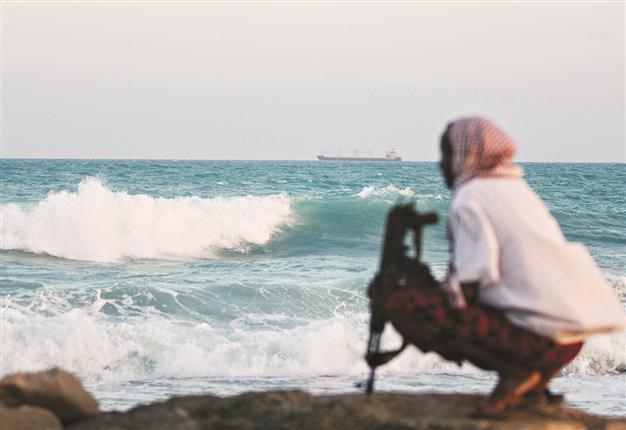Piracy in Somalia an international challenge
ISTANBUL - Hürriyet Daily News

This January 2010 photo shows an armed Somali pirate keeping vigil on the coastline near Hobyo, northeastern Somalia. Piracy is still a major problem for the nation. AFP photo
Incidents of piracy off the coasts of Somalia remain a challenge for both international actors and the country itself. The increase in pirate attacks is linked to insecurity in the country.Somali pirates methodologically prefer to board ships and take the crew hostage to extract a ransom from the ship-owner in return for the release of both the crew and the ship.
According to an estimate by the One Earth Future Foundation (OEF), a Colorado-based think tank studying piracy in international waters, incidents of Somali piracy cost between $6.6 and $6.9 billion in 2011.
Elements contributing to the overall cost are mainly ransoms, insurance, security equipment and guards, military operations, re-routing and increased ship speed.
Prior to 1990 piracy was not a major concern for Somalia. A more structured form of piracy began in the mid 1990’s when some armed groups, claiming to be authorized coast guards charged with protecting Somalia’s fishing resources, started attacking and holding vessels hostage for ransom, charging that they were illegally fishing in their territorial waters. This slowly expanded after 2000 to include any vessel that sailed within or close to Somali territorial waters.
The international community has undertaken an array of efforts to prevent and deter pirate attacks.
NATO, the European Union and the Combined Maritime Forces (CMF) have all established naval operations to counter piracy. CMF is a multi-national naval partnership that includes Turkey, which exists to promote security, stability and prosperity across international waters in the Middle East. It encompasses some of the world’s most important shipping lanes.
A number of countries also run their own anti-piracy operations in waters off Somalia, including Russia, India, China, South Korea, Japan, Malaysia and Singapore. China and Russia have assisted EU forces in escorting United Nations World Food Program (WFP) relief shipments.
Alongside self-defense measures on shipping, these have contributed to a significant decrease in the ratio of successful hijackings to attempts, but have so far been unable to contain the growth in the overall number of attacks and the area in which pirates can operate. International Maritime Bureau’s global piracy report, issued in January 2012, reported 439 attacks in 2011, with 275 of those taking place off Somalia on the east coast and in the Gulf of Guinea along the west coast of Africa. Of the 275 Somali attacks, only 28 resulted in successful hijackings, which was a decrease from 49 seen the year before.
















